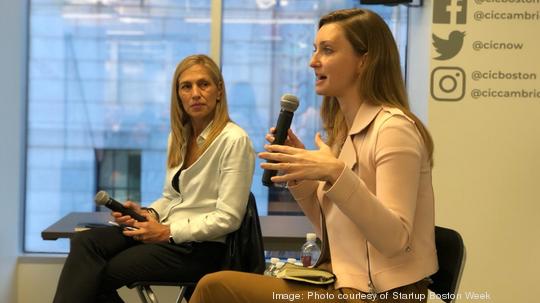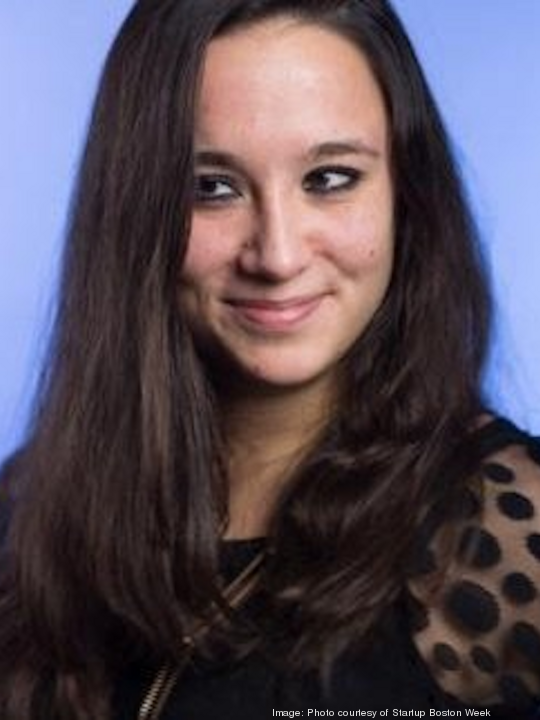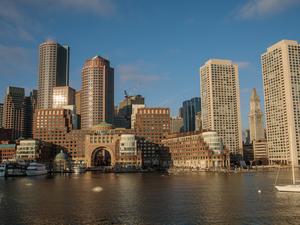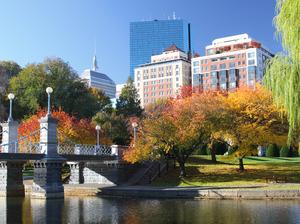
Stephanie Roulic still considers herself fairly new to Boston’s startup scene.
Roulic “stumbled into” the community back in 2016, when she was working to get her own startup, nDash, off the ground. Like so many entrepreneurs, she needed to meet people to talk shop with—other leaders who could give her advice, mentorship or even financial support.
So just a year later, Roulic founded Startup Boston Week. Now in its fourth year, the conference has been reimagined as a weeklong, virtual celebration of Boston’s renaissance as a central hub for startup innovation. Startup Boston Week will feature about 200 speakers, 10 tracks and 70 free events, including two brand-new tracks: one focused on data, and one focused on students.
It’s all part of Roulic’s vision to make Boston a more collaborative, welcoming place for innovators of all stripes.
“The Boston startup scene can be cliqueish at times, which is why we created Startup Week,” Roulic said. “I was new to the startup scene. I wanted to get involved. I didn’t know where to start. But once you do find your people, they will have your back to the very end."
BostInno caught up with Roulic to talk about all things Startup Boston Week and what future she sees for Boston’s innovation economy. This conversation has been lightly edited for length and clarity.
Stephanie, I know you had to pivot once we realized that in-person events will not, in fact, be possible in September or this year probably. I'd love to hear about what that process was like for you.
It’s definitely been an interesting kind of whirlwind the last few months, as it has been for all companies, especially the startups here in Boston. I’ve heard a lot of different stories. The main idea behind Startup Boston Week was we wanted to celebrate, connect and educate the startup community. For us, the harder part of pivoting the conference was really the connecting part.
As we’re bringing the event online, we’ve really been working on making quite a few of the events interactive. One way we’re tackling this is having audience members actually dial in to events. Think of a radio show where you have guests dial in and interact directly with the speakers to ask them their questions. We're also having workshops, both small workshops and larger workshops, so people can come prepared with their materials to follow along with and actually walk away with something tangible. We're also working on hosting a few small group discussions during a couple of these events, too, so people actually have that intimate setting with five to seven people having conversations around very specific things.
Now is definitely, as I mentioned and as you are very well aware of, too, a very hard time for some companies out there. We're actually launching an initiative during Startup Boston Week all about celebrating the milestones the startups have achieved throughout 2020. Those milestones are anything non-funding-related. We’re looking to celebrate the small wins. It’s all the small stuff that you do at a company that adds up and matters. It’s the consistency behind that that helps startups succeed at the end. We are collecting those milestones and sharing them throughout the week, and then also in a wrap-up post. We want to celebrate one another and give startups the recognition they deserve. It’s been a really tough couple months. Starting a company is already difficult. When you've been thrown around and pivoted a few times due to Covid, more reason to celebrate what you have accomplished during these past few months.
I know. Back in March, April, it almost seemed like the startup economy as a whole was going to unwind. Then it turned out that wasn’t true. Now, we’re seeing things get back on pace, with companies bringing in new funding rounds and even launching. Were you surprised to see things get back on track this summer?
Honestly, no, mostly because one of the great things about the startup community in Boston is everyone has your back and everyone’s really supportive. We have that Bostonian attitude, like, ‘You need help? Let's go and help our neighbor out. Let's make sure that our family is good and safe here.’ I found it really rejuvenating to watch people supporting one another on LinkedIn. Normalizing talking about layoffs, I loved, because it's something that happens. And a lot of times it's not in your control. I love that approach. I also really loved over the past couple weeks, there's people sharing statuses on LinkedIn, like ‘If you've been laid off, if you need help with an intro, if you just a coffee pick-me-up, please share this status and please reach out to me. I'm happy to chat with you.’ I think a lot of everyone supporting one another, making intros to investors for entrepreneurs here, has been immensely helpful. Everyone coming together to use their network to support our fellow people has been huge.
Absolutely. I am almost surprised to hear you say, ‘We’ve got this Boston spirit,’ because the thing that I hear from people more frequently is the cliche that New Englanders are not known for their friendliness. That’s kind of funny.
[laughs] I would definitely understand, if you’re not in Boston, it does not look friendly. I can say that from having family from around the globe. I have relatives in Indiana. I have relatives in Singapore. They’re kind of scattered. When they come to Boston, they’re like, ‘Why does no one smile at me? Everyone looks so angry.’ I completely, completely understand that. One thing I will say is that the Boston startup scene can be cliqueish at times, which is why we created Startup Week. I was new to the startup scene. I wanted to get involved. I didn’t know where to start. But once you do find your people, they will have your back to the very end. It’s kind of like that yin-yang there. It can be cliquey, but once you meet people, they will support you. In reverse, if you’re not a good person, we’re a small community. Even though it’s a large city, it’s a very small community. That will travel like wildfire.
Word gets around.
That’s my overview of how the community here works.
How long have you been in the Boston startup scene, Stephanie?
Honestly, not that long. I entered the startup scene in 2016, and I was very new. I graduated college in 2013. I was still trying to figure out my footing, what I wanted to do. Honestly, I thought I was going to be in the film industry. That was my dream all through college. I stumbled into the startup scene in 2016, met up with the right people, co-founded a company called nDash. During that time, I was like, ‘I really need to meet people. I don’t know what I’m doing. I have no idea how to startup and build a company.’ I was in charge of figuring out customer success. I was like, ‘I don’t even know what this is.’ There were so many questions I had as a new founder and also just being new to the startup scene. I create Startup Week. The first Startup Week was in September 2017. I spent about 10 months building that first conference. In the beginning, it was very, very lonely, and then a few months out before the conference, I found a few people to join the team. I really worked to make every event provide you with actual advice to take away, to build your company. We all have the same questions, especially if you’re new. Even if you’re not new, there are so many things that are changing.

How have you seen this community evolve over the last couple years?
I would say I’m probably a little biased, because I was new in 2016, and at the time, it didn’t look this way. Having a few people on the Startup Week team who have been in the startup scene for over a decade, they have also mentioned that the startup scene wasn’t that large in the past. I think it’s definitely become a little bit bigger here in Boston. I feel that the startup community is a lot more blunt, online, talking about the topics that matter the most to them. I also feel like we’re beginning to pull down the barrier and really help one another out.
At the beginning, people were very secretive about what they were doing and what problems they were going through. As the startup community has evolved, it has become a little bit more mature. It has also become more outspoken, which I absolutely love. I think that’s one of the things that places like Silicon Valley have over our head, is that they’re all very much like, ‘This is what I’m doing. These are the problems we’re having. Oh, that company let you go? We’re hiring at this company.’ People just go very in and out of all of those startups in Silicon Valley so you don’t have this barrier of knowledge, which is why I think they tend to have the upper hand on us for a lot of groundbreaking technology. I can see Boston progressing to getting there and being a lot more open with both talent and knowledge sharing. That’s really exciting, because that’s what we need.
How do we get there?
A lot more events that are very ‘how-to.’ If you look at Startup Week, all of the events are organized and not discussions. They are, ‘This is your problem. These are the opinions on how to fix your problem.’ I’d also say—Covid is bad, I want to preface this with that, but one of the nice things that came out of Covid is everyone being a lot more open and actually talking about what’s happening at their company. Talking about needing to make intros and talking about what they need. Additionally, I think one of the other things we need to focus on is—especially in times of Covid—working on creating more tax incentives for startups here. There’s not a lot of incentives for startups to stay and grow in Boston, which is why a lot of companies leave. Creating a partnership with the City of Boston would be huge. I would also—and this might be a little controversial—but getting rid of noncompetes. I think getting rid of them would actually help us a lot more.
This year, you added two new tracks to Startup Boston Week: a student track and the data track. I would love to know about your thought process behind adding those two specifically.
Data actually came about because one of the attendees last year, his name’s Mark White, he used to work at BitSight until he switched. He basically said, ‘Hey, Startup Week is really great, but one of the things you might want to keep in mind is data.’ It wasn’t something I was really thinking about. This was me just honestly not knowing a lot about that. I’m okay saying that. I did not think about startups really using data to help their company, and how all the regulations work. I was like, ‘This is great. We should do it.’ Our staff lead has created all of the events in the data track. He is amazing and knows his stuff. We have some awesome speakers now.
The student track came about because, one, when you’re in college—and maybe I just remember this because I didn’t graduate that long ago—you’re in your own little bubble. You’ll have your groups and your own resources for how you can build a company or who you can network with, but it’s not second nature as a college student to leave your bubble. To go and be quote-unquote professional. Not that students can’t be professional, and in fact we have a lot of student founders speaking, but if you’re new to the space, it’s very difficult to bridge the gap between you and the startup scene as a whole, and also with other students at other colleges. That I remember very vividly was very difficult: to figure out how to make that happen. I also feel like a lot of students will come to Boston colleges and then will leave to go to other jobs. We have kind of a brain drain here. I was hoping, with creating this track, it’ll be like ‘Hey, you guys have a place in the startup community. You can still be in college and still be a part of this community.’ We could help connect them with potential employers, or for student entrepreneurs, mentors and investors as well. This is just the beginning of working on that initiative.
I know we touched on this a bit earlier, but if you had to identify one single thing that you want to see Boston put its energy into changing about the way that things in the startup scene work now over the next 12 months, what would that be?
Definitely fixing the brain drain. For me, that would be both startups that take off here and then leave because they got funding elsewhere and realized they could save a lot of money, moving to another state or get more incentives back tax-wise. Also working with the students. Making them feel more at home here during their four years. A lot of people really do just use it as a landing pad to get a great education, because we have the top schools here in the state, to make a network and then they end up leaving, usually for Silicon Valley. A lot of students are interested in the startup scene and go there. I really want to fix making students feel more connected to the city and also incentivizing entrepreneurs to stay here after they launch their business.





